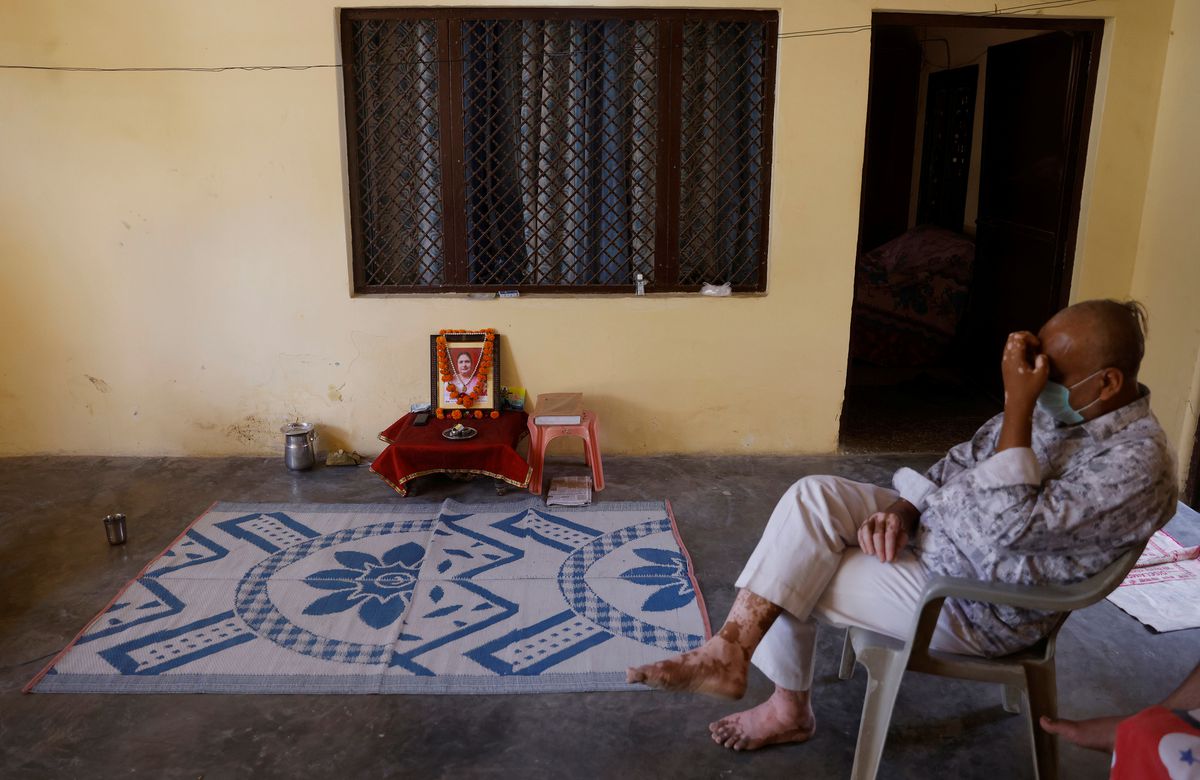
Akhilesh Agarwal, 49, husband of Suman Lata, 50, a teacher who died from the coronavirus disease (COVID-19) after she attended her local election duty in April, sits next to a picture of his wife inside their house in the town of Vrindavan in the northern state of Uttar Pradesh, India, May 25, 2021. REUTERS/Adnan Abidi
MATHURA, India — Suman Lata’s family begged her to refuse a summons to monitor elections in Uttar Pradesh state last month but, worried about losing her job, the 49-year-old mother of three went anyway, just as India’s second coronavirus wave hit a peak.
Two weeks later, she was dead, one of more than 1,600 teachers who died from COVID-19 in the weeks after working at the polls, according to the families of eight victims and mortality data supplied by a teachers’ union.
“She asked if she could be excused but the officers said ‘if you are not sick, you have to do your duty’,” said Lata’s 25-year-old son, Vaibhav Agarwal, sitting in front of her photo, garlanded with flowers at the family’s home in Mathura town, southeast of the capital, New Delhi.
It was not possible to verify how many of the teachers from the eight families Reuters spoke to had contracted the virus when they attended election training or the polling.
Uttar Pradesh state has for now only considered compensation for teachers who died while on polling duty. It says for those who died after polling, there’s no proof they contracted the virus while on election duty.
Primary Education Minister Satish Chandra Dwivedi told media last week only three teachers died while on polling duty. He dismissed the figure of 1,600 from the teachers’ union as “misinformation”.
Spokesmen for the state government did not respond to requests for comment.
Almost all the people interviewed said their relatives began developing symptoms several days after returning from duty.
The others said their relatives were already sick when they were called up but had not been tested for COVID. Their requests to be excused from their duty were refused, the families said.
Swati Gupta, a 32-year-old teacher, fell sick days after attending election training in early April, said her cousin, Amit Kumar Gupta.
“She had written an application to the district magistrate and state election commission to relieve her from duty due to poor health but no reply was received,” he said.
She later tested positive for COVID and died before the polling date.
Election crowds
Sprawling across north India and home to more than 200 million people, Uttar Pradesh is more populous than Brazil. Village-level elections are a huge exercise, with more than 1.3 million candidates vying for 800,000 seats in voting spread over four days in April.
With schools closed because of the pandemic, hundreds of thousands of teachers were called in to help with monitoring voting and overseeing the counts.
Coronavirus cases spiked in the state in April, from official tallies of fewer than 1,000 a day at the end of March to more than 30,000 a day by the end of April.
Hospitals in north India saw an unprecedented crisis in April, with patients dying from a lack of oxygen and beds, while crematoriums worked around the clock.
The federal government led by Prime Minster Narendra Modi has been criticized for allowing mass gatherings throughout April, including a religious festival attended by millions and elections in several states.
News footage of polls in Uttar Pradesh showed crowds of voters jostling in queues, with some not wearing masks. On one occasion, police baton-charged a crowd that thronged a counting centre near Lata’s home.
Plea for postponement
Uttar Pradesh did not go into a state-wide shutdown until April 30, the day after Lata finished polling duty.
“She called to tell us the facilities were really bad,” Agarwal said. She was not provided with hand sanitizer, gloves, or any other protective equipment, he said.
The Uttar Pradeshiya Prathmik Shikshak Sangh teachers’ union wrote several times to the state’s chief minister, Yogi Adityanath, a Modi ally, asking for the polls to be postponed but it said it got no response.
“These deaths could have been avoided if the elections were postponed but the government never paid heed,” said Sanjay Singh, the union’s general secretary.
“The least they could do now is give compensation to every family.”
All eight families that Reuters spoke to said their relatives felt they had little choice but to fulfil their election duty.
Days after returning, Lata fell sick. She was moved to hospital, tested positive for COVID and died on May 14.
Lata was the family breadwinner as her husband is unable to work because of an injury. Without her monthly salary of 65,000 rupees ($895) – which put them firmly in India’s emerging middle class – the family is facing hardship.
A state government suggestion it might provide compensation for teachers it recognizes died after contracting COVID on polling duty has done little to ease the anger over its refusal to postpone the vote.
“She was our mother, she provided everything for us,” Agarwal said. “Money won’t bring her back.”